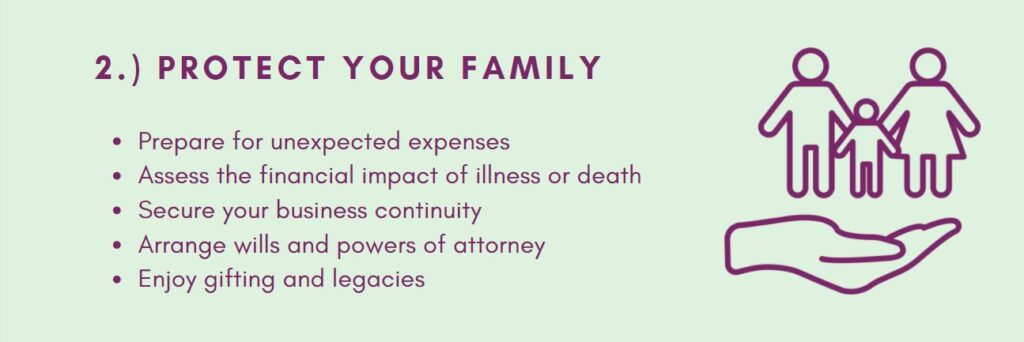To protect your family is to prepare for the unexpected. It’s the bedrock of a good financial plan and an important step on the journey to financial wellbeing. It doesn’t all have to be about planning for emergencies though. There’s plenty of joy to be gained from forward planning and helping to build the financial security of others that you care about.
Everyone with dependents will need to take some action in this area and even those living alone will need to consider most aspects. It’s not for just those with young children, so think about your parents, grandparents, grown-up children and business partners. Perhaps even close friends that you consider to be ‘family’.
Prepare for unexpected expenses
Your financial resilience will be tested from time to time with expenses that crop up unexpectedly. Some good, others not so good.
You might look back on your 20s and 30s, when there may have been a steady flow of wedding invitations, birthday parties and other social events. It was a great time of celebrations, friendships and parties. But it doesn’t half cost money! All good times, but probably not planned into your annual budget.

 Unexpected expenses will test your financial resilience
Unexpected expenses will test your financial resilience
Things change as you move through your 40s and 50s, but you’re never too old for repairs and maintenance of your home and car. Worse still can be the financial impact of redundancy, illness and even death.
To have an emergency fund is a cornerstone of good financial planning. 3 to 6 months’ worth of expenditure is usually recommended as a good amount to have in accessible savings, but it’s really a personal thing and you may prefer more.
Don’t confuse an ‘emergency fund’ with a ‘rainy day fund’. One is for unwanted surprises, the other is for fun. Read more about this in my blog here.
Assess the financial impact of illness or death
You probably don’t want to do this. Who wants to daydream about the aftermath of your own, or a loved one’s death or serious illness?

The emotional consequences are unavoidable, but the potential for financial catastrophe can be averted with some planning. Try to set emotions to one side and consider the practicalities of how you and your family would cope. How would life be if the household income stopped, or was drastically reduced?
If you are not yet financially independent, it’s likely that you or your family will be left with a financial shortfall. Financial planning can test the impact against a range of scenarios, so that potential solutions can be considered.
To insure against every eventuality is usually unrealistic, so it becomes a question of balance and priorities. Keep focussed on the peace of mind that can be gained by protecting your family’s lifestyle.
The Money and Pensions Service sets out easy-to-follow information about life insurance, income protection and critical illness insurance. Well worth a read if you’ve not yet looked into this.
Secure your business continuity
If you run your own business, it’s likely that you and your family are reliant on its ongoing success. The question is the same, whether you work as a sole trader, as a partner or a director of a private limited company:
Have you thought about what might happen if you, or one of your partners or fellow directors died or suffered a critical illness?
Most business owners have not. Research by Legal & General found that 70% of companies have not insured their ‘key people’.
If the smooth running and profitability of your business could be affected by death or illness of a colleague, partner or director, you need to consider insurance. It’s not just yourself and your own family that’s at risk. It’s also a risk to the families of your colleagues and the very existence of the business itself.
Here’s a short introduction to the concept of business protection insurance. This is a specialist area, so it’s worth seeking advice or guidance if it affects you.
Arrange wills and powers of attorney
This is not just for the rich or those in poor health. Dying intestate (without a will) can cause no end of uncertainty, delays, legal expense and often, family arguments. For those with minor children, it leaves a question mark over who might care for them.

Arrange wills and powers of attorney
Despite these downsides, only 41% of adults in the UK have written a will, according to research by Canada Life.
Are you one of the millions of people who keep putting it off? Honestly, it’s not an onerous process and once it’s done, you’ll feel a great sense of relief.
A relatively modern company that specialises in this area is farewill.com. Worth a look if you’re happy dealing online or by telephone and reasonably priced for the service offered.
Powers of Attorney are not as complicated as they might sound. These are legal documents that become invaluable if you lose capacity to make decisions about your money or your health.
Don’t make the assumption that your spouse or family will automatically have the right to make decisions on your behalf. If you want to avoid the courts becoming involved, you need to have powers of attorney in place before your become incapacitated. Best do it now.
Age UK helps explain the benefits of Powers of Attorney in plain language and you can read more in my article, “Power up your family for peace of mind with a Power of Attorney“.
Enjoy gifting and legacy planning
On a lighter note, when thinking about how to protect your family, you can also focus on positive actions. A great deal of pleasure and fun can be gained by planning for nice things. It’s not all about insuring against disaster.
You might be in a financially strong position with a wish to protect your family from inheritance tax. Or maybe you’d like to shield your children from the stresses of paying for higher education or buying their first home.
Outside of family, there may be charities or other organisations that are close to your heart. Why not consider ways to protect their financial future, if you can afford to do so?

People often leave money in their will for loved ones and charitable causes. But if you can afford it now, surely it’s better to “give with a warm hand rather than a cold hand”? That way, you can enjoy seeing the benefits of your gifting while you’re still around.
If you really start to get into this, you can be much more proactive and begin to consider philanthropy. It’s not just for the super wealthy. There’s some great information about this from the Charities Aid Foundation.
Summary
So that’s five pretty chunky things to think about. Nevertheless, it’s worth making the effort. Having these foundations in place not only gives you peace of mind, it helps protect your family, friends and colleagues from all sorts of uncertainty and bureaucracy.
Protect Your Family is the second stage of the GroWiser Financial Coaching ‘SPEND’ programme:
- Savour Your Spending
- Protect Your Family
- Eliminate Your Debt
- Nurture Your Wealth
- Design Your Future


Often, a feeling of overwhelm, competing priorities and procrastination prevents action. Financial coaching can help you gather your thoughts, prioritise, and keep motivated. Breaking it all down into small, step by step actions will get the results you want.
To find out how financial coaching might help you, book a free 30 minute chat or if you’re not ready for that, sign-up for weekly updates by email.




 Production
Production
